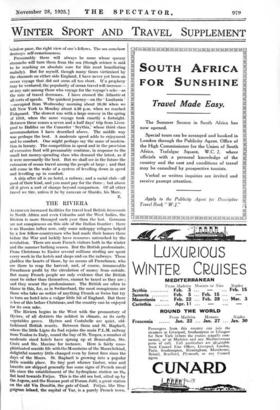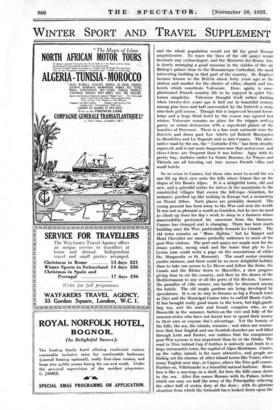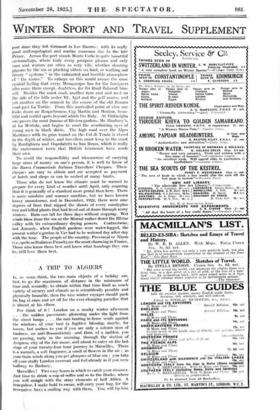THE RIVIERA
ALTHOUGH increased facilities for travel lead British hivernants to North Africa and even Colombo and the West Indies, the Riviera is more thronged each year than the last. Germans are not conspicuous on this side of the Italian frontier : there is no Russian influx now, only some unhappy refugees helped by a few fellow-countrymen who had made their homes there before the War and luckily have resources untouched by the revolution; There are more French visitors both in the winter and the summer bathing season. But the British predominate. From Christmas to Easter several millions sterling are spent every week in the hotels and shops and on the railways. These gladden the hearts of those, by no means all Frenchmen, who are there to reap the harvest, and, of course, innumerable Frenchmen profit by the circulation of money from outside. But many French people see only evidence that the British must be richer than themselves, cannot be taxed as they are ; and they resent the predominance. The British are often to blame in this, for, as in Switzerland, the most conspicuous are those who take no notice of anything French or Swiss but try to turn an hotel into a vulgar little bit of England. But there is less of this before Christmas, and the country can be enjoyed for its own sake.
The Riviera begins in the West- with the promontory of Hyeres, of all districts the mildest in climate, as its early vegetables prove. Hyeres and Costabelle are quiet, old- fashioned British resorts. Between them and St. Raphael, where the little Ligne du Sud rejoins the main P.L.M. railway from Toulon to Italy, round the bay of St. Tropez, a number of moderate sized hotels have sprang up at Beauvallon, Ste. Croix and Ste. Maxime for instance. Here is fairly unso- phisticated seaside Iife with theMountains of the Moors behind, delightful country little changed even by forest fires since the days-of the Moors. St. Raphael is growing into a popular little seaside place. Its tiny port whence timber, wine and bauxite are' shipped generally has some signs of French naval life since the establishment of the hydroplane station on the flat land towards Frejus. This is the old sea bed, silted up by the A rgens, and the Roman port of Forum Julii, a great station on the old Via Domitia, the gate of Gaul. Frejus, like Dra- guignan inland, the eapital of Var, is a -purely French town, and the whole population would not fill the great Roman amphitheatre. To trace the lines of - the - quayS would fascinate-any archaeologist, and the Ministere des Beaux Arts is slowly arranging a good museum in the Stables. of the old Bishop's palace close to the Romanesque Cathedral, the most interesting building-in that part of the conntry. St. Raphael becanie known to the British about fOrty years ago as the station and market- for the cluster of villas; church -and two hotels which constitute Varescuie. Here, again, is• unso- phistiCated French country life to be enjoyed in , quiet Vic- torian simplicity. Valeserire --thought -itself rather -dashing When twenty-five years ago. it laid out in beautiful. scenery among- pine trees.:and half surrounded by the Esterels a stony nine-hole golf course. Though this is improved-beyond know- ledge and a -large third hotel by the course was opened last winter; Valescure remains no place for the tripper :seeking gaiety or urban distraction with a superficial glance at the beauties of Provence. There is a fine route nation ale over the Esterels and down past Les Adrets (of Robert Macquaire) to Mandelieu and La -Napouleand-so-into Cannes.. The alter- native road by the sea, the " C.orniche d'Or," has been steadily mproved, and is not more dangerous now-thatmotor-cars and chars-a-banc are frequent than it was before.- Agay with. its pretty bay, Antheor under La Sainte Beaume, Le Trayas and Theoule. are all bursting out - into • rococo -French' villas and - small hotels. - - - - - • • So- ive come to Cannes, but -those who want to avoid the sea. can lift -up their. eyes unto -the hills where Grasse lies on the slOpes of the Basses Allies: . It.isa delightful town, old and new, and a -splendid Centre for drives in the 'mountains to-the constricted villages that crown the hill-tops_----dotridon, . instance, perched up like nothing-in Europe but a monastery on , Mount Athoi. Such places are -probably doomed... The ' young peasant has been away- to the War-strid- seen the world. It was not so pleasant a -world as Gourdon, -but he sees no need. to climb up from- his day's work- to sleep in a -fastness whose : inaceessbility protected-;- his -ancestors -from :---the Saracens. - Cannes :has changed and is clianging.::. There has been :much &Aiding since the War; particularly towards Le Cannet. The old town remains on " Mons .2Egitna," but Le Suquet and . :Mont Chevalier are names probably unknown to most -of the 'post-War visitors. - The-port and quays are ample-now for the steam- yachts, racing craft and the boats that --ply-. to Les Lerins (one Could write a page on the associations 'of .either Ste. Marguerite or St. Honorat). The small motor cruising yachts increase, and there could be no more delightful holiday than to take one across to Le Havre and follow the Seine, the Canals and .the Rhone down to Marseilles, a slow progress giving time to see the country, and then by the shores of the Mediterranean to any or all the ports of the Riviera. Cannes: the paradise of villa owners, can -hardly be 'discerned among the hotels.- The .old ample gardens are being developed -by speculators. It is on its way to become as big a French town as Nice and the Municipal Casino tries to outbid -Monte Carlo. It has- brought really good music to the town, but high gainb- ling rtoo, and the male and female vampires- who, as at Deauville in the summer, batten on the vice and folly of the nouveau-riches who have not learnt how to spend their money to their own or anyone else's advantage.: Yet the beauty of thehills; the sea, the islands, remains ; and when one remem- bers . that four English and one Scottish churches are well filled through Lent and Easter, one realizes that the conspicuous post-War eyesore is less important than he or she thinks. The road to Nice behind- Cap d'Antibes is unlovely and leads to a large unromantic town, the capital of Alpes Maritimes. Cimiez, up the valley- inland, is far more attractive, and people are finding out the charms. of other inland towns like Vence, where many English now stay, Or Cagnes, above the Nice golf course. Further on, Villefranche is a beautiful natural harbour. Beau- lieu is like a sun-trap on a shelf, -for here the hills come down to the sea. After Eze comes Monaco with its Palace, before Which one may see half the army of the Principality relieving the other half of sentry duty at the door ; with its -glorious situation from which the Grimaldi have looked down upon the port since they left Grfirtatid in Les Maures ; with its really good anthropological and marine museums due to the late Prince. Across the port stands Monte Carlo in quite beautiful Sinioundings, where truly every progPect pleases and • only man and woman arc often so very vile, whether shooting pigeons by the Sea or `plucking others on land, or Working out 'dreary " systems " in the exhausted and horrible atmosphere of " the /bon's." To enlarge on this would arouse the' same cfnieal feeling that every Monag,asque has for the foreigners . who come there except, doubtless, for Sir Basil Zaharoff him- self. Besides the coast road, another runs east and west on the side of the hills under Mt. Agel and the golf course, and 'yet another on the summit by the course of the old Roman road past La Turbie. •FiOm this unrivalled point of view one lOoks down on Roquebrunne, Cap Martin and Menton, beau- tiful and restful spots beyond which lies Italy. At Vintimiglia one passes the most famous of Riviera gardens, Mr. Hanbury'S, at La Mortola, and begins to meet the scrutinizing eyes of yOung men in black shirts. The high road over the Alpes 'Maritimes with its grim tunnel on the Col di Tends is closed iii the depth of winter, and travellers must keep to the coast :bY Bordighiera and Ospedaletti to San Remo, which is really the easternmost town that British hivernants have made ;their owe.
: To avoid the • responsibility and irksomenesS of carrying large sums of money on one's person, it is well to know of the Banat Cimunericale Itatiana Travellers' Cheques. These cheques are. easy to obtain and are accepted as payment at hotels and shops or can be cashed at many banks.
Those who do not know the climate must be warned to prepare for every kind of weather until April, only counting that it is generally of a standard more genial than here. There Is more sunshine and warmer sunshine, but we have known heavy snowstorms, and in December, 1922, there were nine degrees of frost that nipped the shoots of every eucalyptus tree and killed plants that had lived out of doors through many winters. Rain can fall for three days without stopping. Wet winds blow from tote sea or the Mistral rushes -down-the Rhone valley with its extraordinary drying powers. Contrariwise, last January, When English gardens were water-logged, the present writer's garden in Var had to be watered day after day with the hose. The people of the country, Provençal or Nieois
quite as Italian as French) are thernost charming in-France, Those who know them best and know what humbugs they can be, Still love them best.
























































 Previous page
Previous page